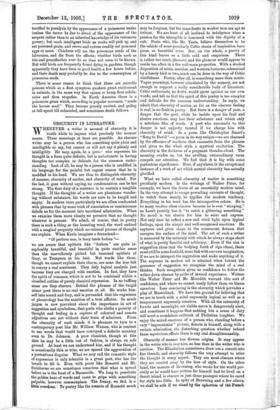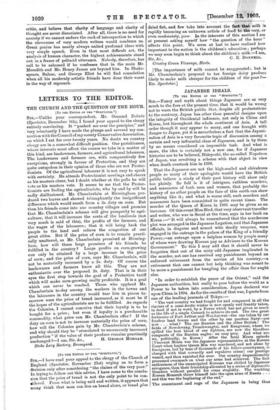OBSCURITY IN LITERATURE.
NvRENEVER a writer is accused of obscurity it is worth while to inquire what precisely the accuser means. Three meanings at least are possible. An obscure writer may be a person who has something quite plain and intelligible to say, but cannot or will not say it plainly and intelligibly. He may, again, be a perso- who expresses his thought in a form quite definite, but is unfortunate in having thoughts too complex or delicate for the common under- standing. Last of all, he may be a person who is muddled in his language for the painful but cogent reason that he is muddled in his head. We are thus to distinguish obscurity of manner, obscurity of matter, and obscurity of mind. For the last, it goes without saying, no condemnation can be too strong. The first duty of a sentence is to contain a tangible thought. If the thoughts of a writer are phantoms wander- ing without substance, his words are sure to be turgid and empty. In modern verse particularly we are often confronted with phrases that by some trick of association or reminiscence delude us for the moment into uncritical admiration. When we examine them more closely we perceive that no thought whatever is present. We admit, of course, that in poetry there is such a thing as the haunting word, the word endued with a magical propriety which no rational process of thought can explain. When Keats imagines a dreamland—
"Of perilous seas, in faery lands forlorn "-
we are aware that epithets like " forlorn " are quite in- explicably beautiful, and beautiful in quite another sense than the marvellously picked but reasoned epithets of Gray, or Tennyson at his best. But words like these, though we cannot explain their charm, are none the less felt to convey a real sentiment They defy logical analysis just because they are charged with emotion. In fact, they have the spirit of romance, which is not to be contained within a chiselled outline of purely classical expression. In no baffling sense are they obscure. Behind the phrases of the turgid minor poet there is no real emotion at all. He works him- self into sound and fury, and is persuaded that his vagueness of phraseology has the sanction of a true afflatus. So much jargon is now prevalent about the importance in art of suggestion and symbolism, that poets who clothe a poverty of thought and feeling in a rapture of coloured and remote adjectives are not without their train of admirers. From the obscurity of such minds it is pleasant to turn to a contemporary poet like Mr. William Watson, who is content to use words that would have conveyed a definite meaning even to Dr. Johnson. A pure classicist, though at this date he may be a little out of fashion, is always on safe ground. At least we can understand him, and if his thought is occasionally thin or trite, we are spared the aggravation of a pretentious disguise. What we may call the romantic style of expression is only tolerable in a great poet, who has the breath to fill it. Even with poets like Rossetti and Mr. Swinburne we are sometimes conscious that what is spread,
before us is the feast of a Barmecide. We long to penetrate the golden haze of words and come to grips with something. palpable, however commonplace. The frenzy, we fed, is 'a little overdone.- To poetry like the sonnets of Rossetti much
may be forgiven, but the same faults in weaker men are apt to irritate. We are least of all inclined to indulgence when a passion for the intangible is honoured with the dignity of a cult. Poets who, like Mr. Yeats, believe themselves to be the vehicle of some peculiarly Celtic strain of inspiration have
given us beautiful verse. But, on 'the whole, a poetry of this kind leaves us a little cold and suspicious. There
is rather too much glamour, and the glamour would appear to reside too often in a few well-worn properties. With a studied disposition of mists, marshes, and western 'horizons, solemnised by a lonely bird or two, much can be done in the way of Celtic wistfulness. Poetry, after all, is something more than music. Vague yearnings, however stimulated by the scenery, are not enough to support a really considerable body of literature. Celtic enthusiasts, no doubt, would quote against us our own words, and tell us that the spirit of this poetry is too complex and delicate for 'the common understanding. In reply, we admit that obscurity of matter, so far as the obscure feeling is real, is no fault in poetry. But there is a danger of pose, a danger that the poet, while he insists upon his frail and elusive emotions, may lose their substance and retain only a nebulous film of words. A poet who succumbs to this danger is not unjustly treated if we charge him with obscurity of mind. In a poem like Christopher Smart's "Song to David "—a, poem in its way unique—we are charmed by the effluence of madness that emanates from the phrases and gives to the whole style a mystical exaltation. The obscurity is the darkness of a pregnant thunder-cloud. The meaning evades us, but the swelling, extraordinary verse compels our attention. We feel that it is big with some portentous significance. Here, if anywhere, is the exceptional instance of & work of art which mental obscurity has actually glorified.
What we have called obscurity of matter is something peculiarly modern. In the writings of Walter Pater, for example, we have the fruits of an essentially modern mind. In the very attempt to escape prevailing currents of thought, to watch them merely, he typifies the modern tendency. Everything in his work has the introspective colour. He is to many readers often obscure because he is ever "stooping," as Lamb prettily has it, "to catch a glittering something." No mood is too elusive for him to seize and express. Not only does he reflect a new and vivid light upon typical feelings, upon the simple and well-recognised emotions. He captures and gives shape to the evanescent flotsam that occupies the surface of the mind. The art of such a writer is measured by the certainty with which he always stops short of what is purely fanciful and arbitrary. Even if the aim is suggestion alone (not the bodying forth of ripe ideas), there must still be some foothold, some link with our own imagination, if we are to interpret the suggestion and make anything of it. The supreme in modern art is attained when behind the gossamer of suggestion we recognise the mind of a real thinker. Such recognition gives us confidence to follow the writer down obscure by-paths of inward experience. Writers like Walter Pater and Mr. Meredith warrant this sort of confidence, and where we cannot easily follow them we blame ourselves. Less convincing is the obscurity which pervades a play of Maeterlinck. We have less ground for believing that we are in touch with a mind supremely logical as well as a temperament supremely sensitive. With all the solemnity of forests and moonlight, our risible nerve is dangerously alert, and sometimes it happens that nothing but a sense of duty will avert a scandalous outbreak of Philistine laughter. We enjoy the mixed emotions of a person who, standing before a very " impressionist " picture, detects in himself, along with a certain admiration, the disturbing question whether behind those mysterious effects there is any real draughtsmanship.
Obscurity of manner has diverse origins. It may appear in the writer who is over nice, no less than in the writer who is careless. The Elizabethan sonnetteers draw out a conceit into fine threads, and obscurity follows the very attempt to utter the thought in every aspect. They are most obscure where they are carried away by the love of style. On the other hand, the manner of Browning, who wrote for the world pre- cisely as he would have written for himself had he lived on a desert island, is obscure in just those passages where he cared for style too little. In spite of Browning and a few others, we shall be safe if we stand by the aphorism of the French
critic, and believe that clarity of language and clarity of thought are never dissociated. After all, there is no need for anxiety if we cannot endure the rack of introspection to which the cleverness of very modern writers would condemn us. Great genius has nearly always united profound ideas with very simple speech. Even in that most difficult art, the analysis of human character, the highest achievements stand out in a frame of pellucid utterance. Nobody, therefore, has call to be ashamed if he confesses that in the main Mr. Meredith and Mr. Henry James are beyond him. In Shake- speare, Balzac, and George Eliot he will find consolation when all his modernly artistic friends have done their worst in the way of reproach.



























































 Previous page
Previous page